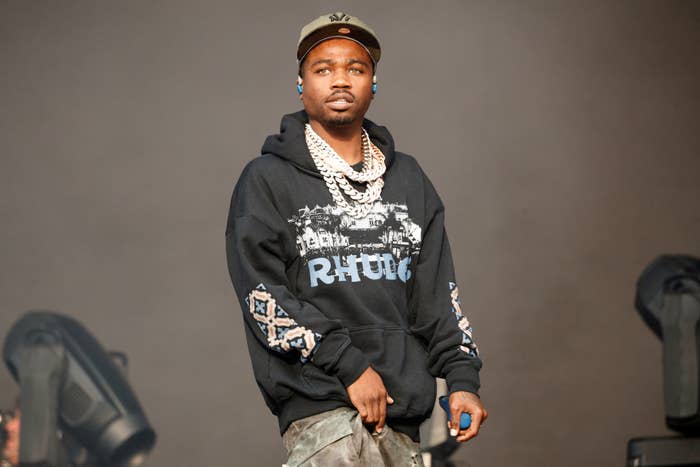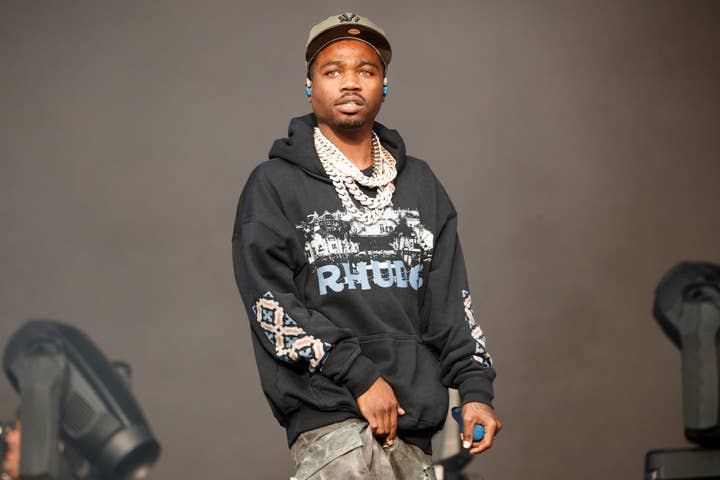
Rap is littered with blunt life or death aphorisms, but even by those harsh standards, the opening of Roddy Ricch’s breakout single, “Die Young,” feels abrupt: “I don’t wanna die young, so I ride with one.” Recorded hours after he saw news of XXXTentacion’s death on a TV in the studio, the bar feels more logistical than poetic — a matter-of-fact survival guide for a world of unactualized dreams and premature funerals. Raised in Compton, Roddy was always aware of those potential outcomes, and had things gone differently, maybe he’d have had to face them. Instead, he’s calling in from his Los Angeles home for a Zoom interview on the Eve of Halloween, just three days before the fifth anniversary of his star-making mixtape, Feed Tha Streets II. he project crystallized his status as the West Coast’s proverbial next up in 2018, but he appreciates the literal and figurative journey more than superficial classifications.
“I traveled around the world off a mixtape,” Roddy tells Complex, recalling his tour for the Feed Tha Streets II. “I had project niggas in Europe.” Roddy’s gone on to perform in even larger venues, and he’s now gotten 25 RIAA certifications, more than he can likely remember in one setting, but his ascent undoubtedly began with Feed Tha Streets II. The road there was paved with unexpected lessons, intense studio sessions, and long-lasting work relationships.
Traveling to the legendary Scott Storch’s home in 2018, Roddy remembers being in awe of the producer’s weed bar. He was in for a little surprise once he met the man himself. “I’m a musical nerd,” Roddy says, “[but] I swear to God, I didn't know he was white.” After getting acquainted with Storch’s lush home, he gave the producer feedback on how to approach their collaboration. “I said ’Hey, I know you been doing this shit…but these 808s, you make them hit like this — this is how the young niggas do it.” “Down Below” was born from that meeting. Featuring muted keys and some of Roddy’s customarily expressive vocals, the track is a classic tale of an artist’s come-up, which the then 20-year-old was in the middle of.
Roddy Ricch started rapping at age 16, the same year he copped some equipment for his bedroom studio. In subsequent years, he was immersed in the streets, even as he pieced together his first songs. Then, in November 2017, at age 19, he unloaded the first Feed Tha Streets, a project where his melodic style coalesced into something distinct, with tracks like “Fucc It Up” showcasing an uncommon combination of elasticity and conviction in his tone.
Across the coast, in Atlanta, producer Sonic was crashing in Lil Durk’s basement. The aspiring producer had previously worked on tracks with Money Man (“Drippin’ n’ Leakin’,” “Loyalty”) and Jay Critch (“Bottom Line”). When his producer friend Chase Davis told him about an emerging Roddy, Sonic spent the last of his money on a flight and an Airbnb to work with the upstart. He promptly noticed similarities between Roddy and one of his other known collaborators.
View this video on YouTube
“When I first met Roddy, he already knew his way around Pro Tools. He knew how to record himself [and] he knew how to mess with the melodies,” Sonic recalls. Through various recording sessions both in person and through emails and texts, Roddy and Sonic crafted “Faces,” “Can’t Express,” and “Area Codes,” all of which landed on Feed Tha Streets II. Roddy appreciated the link-up. “[Roddy’s like] ‘I'm going to make sure you're always good [/included] on every album,’” Sonic says. “And it's literally been like that to this day.”
Indeed, much of Roddy’s creations are threaded by deep connections. On the road to one of his biggest songs, he shares that he took inspiration from one of his biggest mentors. “Young Thug is like my guru in this shit,” Roddy says of Thugger, who told him to remember to pay his taxes. Stylistically, there was already a lot of overlap, so it only made sense that Roddy would seek out the chance to work with Thugger’s frequent beat suppliers, including London on da Track. In June 2018, he connected with London at the studio for the first time. “I picked some beats, and he ain't give me none of the beats that I picked,” Roddy recalls. Days later, they reconnected, and Roddy heard a beat he liked. When he and London saw the news about XXXTentacion’s murder, Roddy noted the saddening familiarity. “Where I come from we go through a lot of that shit all the time,” he says.
Listening to London’s stylish, yet forlorn instrumental, Roddy began writing “Die Young,” a track that deals in defense more than aggression—a 2018 version of the old African proverb, “Speak softly and carry a big stick.” This approach was the result of both logic and his own need for originality. “Nobody ever gives you the perspective of like, ’Hey nigga, I'm a nigga that got my brain on right. I'm moving out here, I know what's going on. But at the end of the day, it still could be that too,” he says in reference to the prospect of violence. “I kind of wanted to give a perspective of, ‘I'm not trying to die young, so this is how I do it.’”
To date, “Die Young” has been certified twice platinum. More significantly, it stands as a memorial that only grows more relevance with the death of each rapper. Since dropping the track, artists like Juice Wrld, PnB Rock, Pop Smoke, and too many others have died at a young age. Sadly, Roddy’s friend and collaborator Nipsey Hussle was fatally shot less than a year after appearing in his visual for the track. “Those times hit hard, but I’m grateful that I have music that can mend broken hearts,” Roddy shares.
Since its release half a decade ago, Feed Tha Streets II has been certified gold, and “Down Below” and “Die Young” have been streamed over 500 million times. After getting his first advance for the mixtape, Sonic quit his day job at Menard’s home improvement store as his producer dreams began to solidify. “That gave me enough money to move around and made me decide, ‘Okay, now I got to go all gas, no breaks, because if it is not this, then what is it?”
If you’ve been following Roddy, you know what happened next. Feed Tha Streets II became a dominant force in music, with two No. 1 singles on the Billboard Hot 100; his 2019 effort, “The Box,” held the top spot for 11 weeks.
View this video on YouTube
While many creators reflect on the distance money and fame put between themselves and their family, Roddy says he’s seen the exact opposite. “I got kicked out of my house when I was 15, 16 years old,” he shares. “So it was just a different time and space. Now, I've been able to even rectify those situations,” he says.” I have one-on-one conversations with my family and they tell me how they feel. It's been a blessing to build more relationships outside of what we started with.”
Those repaired connections have coincided with a healthier Roddy. “I feel like a nigga's in a better space, because for a long time I was jaded. I did feel like people owed me something,” he says. "I really just want to give everybody my best version of myself because I owe it to the people who changed my life.”
He says the level-ups are cool, but his actual goal shares a title with his Feed Tha Streets series. “[Feed Tha Streets II] is like the first couple of steps on the ladder, us all being together and climbing up that ladder. That was the greatest feeling,” Roddy says. “And that's what that shit is all about. Really feed the streets—feeding your people, feeding your algorithm, your supporters and the people that listen to you.” Half a decade later, he feels like it’s a mission accomplished. “[Feed The Streets II] continues to live in place and motivate people to keep going every day.”
Good music is an underrated way to live forever.



